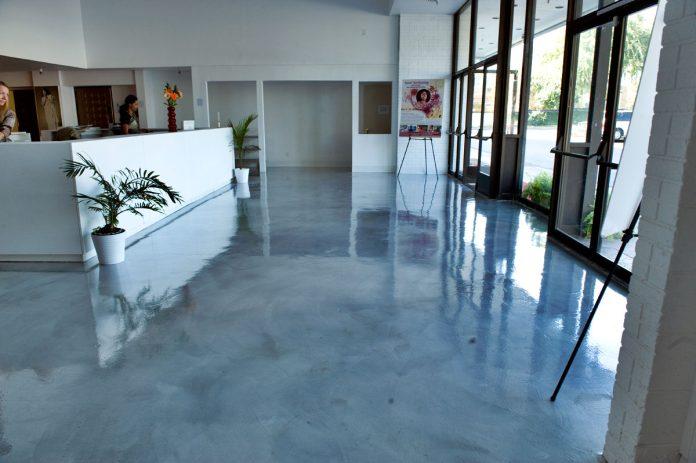If you are searching for a flooring solution that combines durability, effectiveness, and aesthetic appeal, epoxy is a suitable option. But not all epoxy resins are made equally. Therefore, it’s critical to understand the types available so that you receive the best and most longest-lasting finish possible.
What Is Epoxy Flooring?
Epoxy flooring is a sturdy flooring treatment because it successfully combines strength, durability, and style. This flooring choice is becoming more and more popular in office, retail, and residential settings. It is a durable floor covering option because of its seamless surface and sturdy construction. Epoxy floor covering is made to withstand all sorts of stains, chemicals, and moisture concerns. You have more time to concentrate on what matters because cleaning and maintenance will no longer be difficult.
Epoxy floors, however, not only shine in terms of practicality but also in terms of style. You can also alter this flooring to fit any aesthetic because of the variety of colors, treatments, and patterns. An epoxy floor is available in both bright and vibrant designs as well as sleek and contemporary looks.
Reasons Why The Type Of Epoxy Used Is Important?
The type of epoxy used is vital as it influences the overall performance, longevity, and usefulness. Here are some major reasons why considering the type of epoxy used is critical:
1. Strength And Durability
Strength and durability levels can vary amongst different epoxy compositions. Epoxies can survive high amounts of foot traffic, collisions, and chemical exposure. Some are made for heavy-duty uses. Selecting the proper epoxy type guarantees that the flooring or coating can withstand the unique requirements of the environment where it will be installed.
2. Chemical Resistance
Excellent chemical resistance is offered by several epoxy formulations, including resistance to acids, solvents, and oils. This is especially crucial in situations like factories, research facilities, or locations where chemical accidents are common. Using epoxy with high chemical resistance protects the flooring’s durability and integrity from failure or damage.
3. Temperature Resistance
Extreme temperature situations, such as those in cold storage facilities or production areas, can benefit greatly from the use of epoxy. That’s because it can endure all kinds of circumstances. Some epoxies are manufactured to maintain structural durability and performance even under high temperatures. It guarantees that the flooring or coating stays stable and dependable.
4. UV Resistance
Epoxy surfaces may fade, lose color, and degrade when exposed to sunshine and UV radiation. Therefore, it is important to select a UV-resistant epoxy if the floor coating will be exposed to UV radiation, either naturally or artificially. These epoxies have been specifically designed to withstand UV deterioration. These can easily retain their appearance and functionality over time.
5. Moisture And Water Resistance
Choosing an epoxy with great moisture and water resistance cannot be overstated for locations. They are subject to moisture, such as in bathrooms, kitchens, or outdoor areas. The likelihood of mold, mildew, and water-related damage is decreased since these epoxies stop water from penetrating. To ensure the durability and stability of the flooring, they also act as a barrier against moisture.
6. Anti-Static Properties
Static electricity can harm equipment or cause safety issues in delicate settings like laboratories, server rooms, or factories that manufacture electrical devices. There are anti-static epoxy compositions that spread static charges. This can create a secure and controlled environment. Selecting an epoxy with anti-static features guarantees the safety of employees and delicate equipment.
7. Decorative and Aesthetic Options
Epoxy flooring can improve a space’s aesthetic appeal as well as its utility. Metallic treatments, decorative flakes, and unique designs are all available with different types of epoxy. You can accomplish the required aesthetic effect by picking the proper epoxy. It can improve the overall design and ambience of the place.
8. Application Method And Time
The application method and cure time might also be influenced by the type of epoxy used. Some epoxies are self-leveling, making installation simple and fast. Others may cause more complex application procedures or longer curing times. Understanding the properties of the epoxy leads to a smooth and fast installation process that minimizes downtime and disturbances.
9. Budget And Cost Considerations
The price of epoxy varies according to its type and grade. Choosing the best epoxy requires an obvious balance between performance, durability, and cost. While high-performance epoxies may have a greater initial cost, their longevity and lower maintenance requirements generally result in long-term cost benefits.
Coming To An End
The effectiveness, purposefulness, and longevity of the flooring or coating are frequently influenced by the type of epoxy used. The choice of the most suitable epoxy flooring options for homes, offices, and factories should consider factors like strength, chemical resistance, temperature resistance, UV resistance, moisture resistance, and anti-static properties. Decorative options, application techniques and budgetary considerations should all be considered when choosing the best epoxy for the project’s unique needs.
